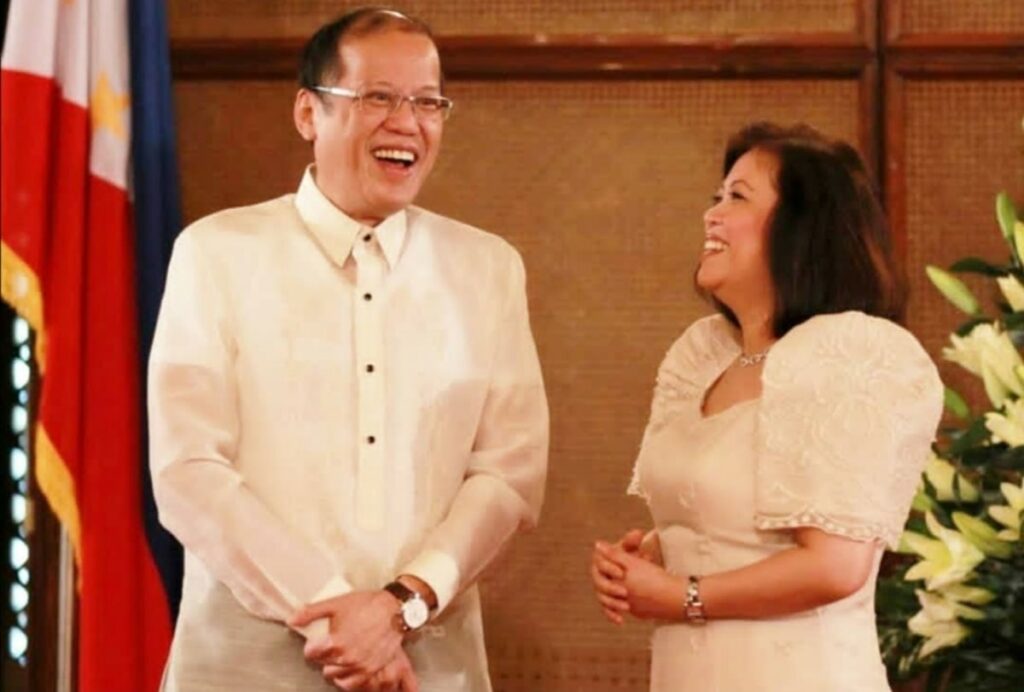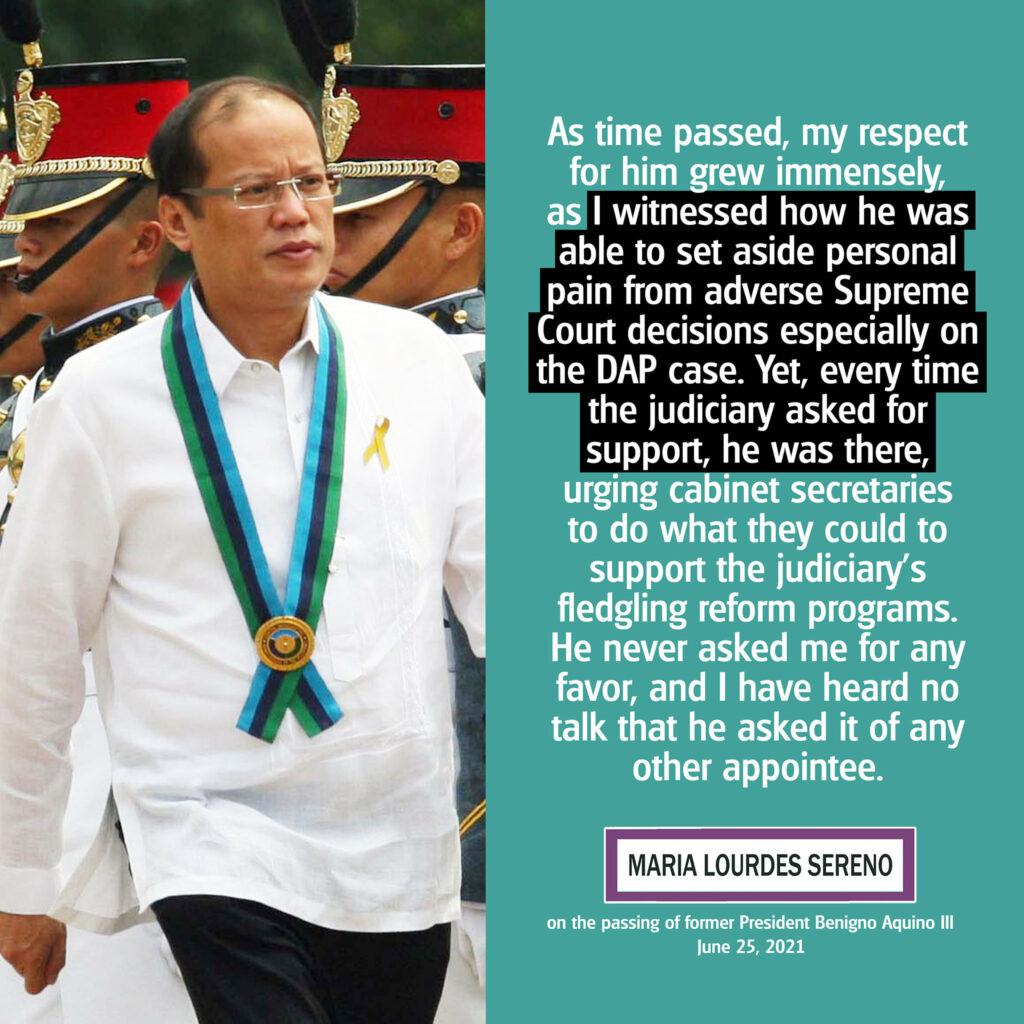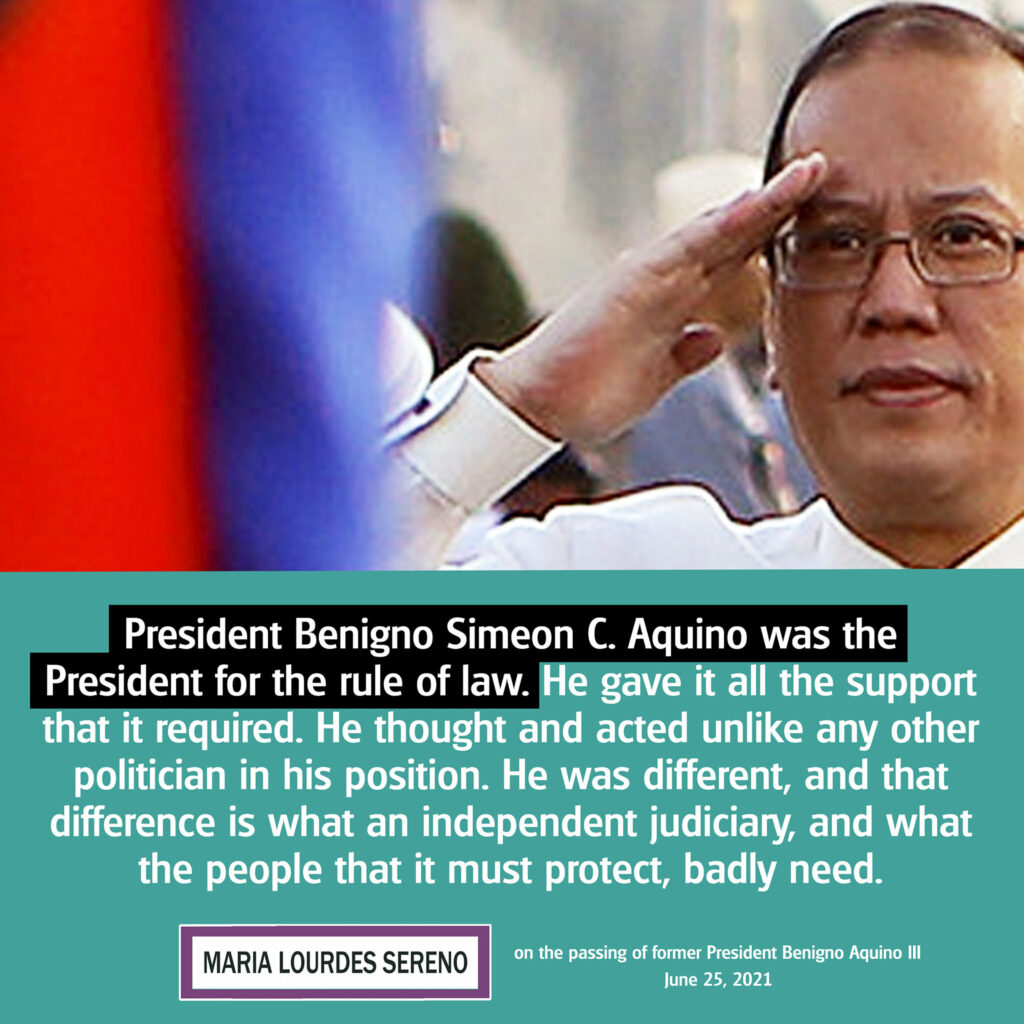HOW DIFFERENT WAS PRESIDENT AQUINO FROM MANY POLITICIANS?
By Maria Lourdes Sereno
June 25, 2021

I have not known any President who was amused at his own decision of appointing a seemingly disinterested candidate to the Supreme Court, other than PNoy.
On August 13, 2010, a Friday, my husband, our daughter, our son, and I were making our way by taxi from the Davao airport for the city, where we were to attend the Sereno Family Reunion. Weeks earlier, the Judicial and Bar Council had submitted an original shortlist of 6 nominees to the President for the vacant position of Associate Justice of the Supreme Court. It would be his first appointment to the court and I was the only female in the list.
It was a risky trip for me. I knew that on the following Monday, August 16, the 90-day constitutional period for filling a vacancy in the Court would expire. Normally, candidate interviews were scheduled by Palace officials weeks or days before the deadline. Sometimes, if the appointment was considered “critical,” the President himself might conduct the interview.
But I had to accept the risk of leaving Manila, as I had long promised to be with my family to attend this important clan event. My husband was born and raised in Davao; and to me, my word was my bond. In my heart I had said: if God wants me to be appointed, I will be appointed; if not, fine. I didn’t place any high hope in an appointment. I had strong endorsements from retired Chief Justice Reynato Puno, retired Senior Associate Justice Florentino Feliciano, former colleagues in the law faculty, several law groups and two presidents of the Asian Management Center, but none from any person known to have the ears of the president.
After unloading our luggage, our family proceeded to lunch at Aphat, the famous Chinese seafood restaurant.
It was past 12 when I answered a call on my mobile phone from an unlisted number. The speaker, who introduced himself as the aide of the President, said the President wanted to see me for an interview and if I could come to the Palace right away. Dumbstruck, I stuttered and explained I couldn’t go “right away” because I was in Davao. I promised to take the first available flight back to Manila, and I did the most outrageous thing – I asked the aide if he could convey to the President my request for the President to wait for me while I hop on the first flight out. The poor Palace aide could only promise to convey my request. I rang Philippine Airlines and Cebu Pacific offices only to find out that the first available flight to Manila was at 5:30 pm, so I rang the President’s aide to ask if he could request the President to wait for me until perhaps about 8:30 or 9 pm. I knew it was an impossible request, it could make the President very peeved at me, but I had to try.
The aide rang back after many minutes, saying, “The President said he will just interview you now on the phone.” I almost fell off my chair. After regaining my composure, I replied: “Aaah, aaah, mahihirapan ho kaming magkarinigan dito, Sir, kasi nasa Chinese restaurant po ako at napakaingay dito.” I proposed instead for the President to give me time to return to my hotel room whereupon he could conduct the long-distance telephone interview. I was waiting with bated breath, not knowing if the President would be so irritated with this audaciously difficult applicant and cut short my prospects then and there. To my utter amazement, the aide responded after a while: “Ok daw, sabi ni President.”

My family, whose eyes were popping at the exciting turn of events, could only nod in agreement when I said I needed to hail a taxi to return to the hotel for the interview. Nearly frantic with the suddenness of it all, I ran out of the restaurant and on to the street waving at every cab headed in my direction. My daughter had to cut her own meal short to run after me with my handbag. How was I supposed to pay for my fare without my purse?
At the hotel, his aide was finally able to patch me through to the President. He was speaking very quickly, and my cellular phone signal was weak, so I had to ask him to repeat his questions several times. “Ano ho?” “Pakiulit ho.” “Hindi ko kayo marining, Sir, ang hina ng signal.” Until at last: “Sir, puede po bang ibigay niyo na lang iyong telepono sa aide niyo, ibibigay ko po ang landline ng hotel at room number ko, at sa landline na lang tayo mag-usap?” I simply cannot forget my almost cheeky request, and everytime my chutzpah comes to mind, I end up laughing at myself. But surprise of surprises, he again said yes! What humility, what graciousness in the highest official of the land. I could not help but marvel.
At last, we were able to talk over the landline in my hotel room. He asked me about my judicial philosophy, my view on certain issues, and challenged me with his key question: “Professor Sereno, if I appoint you, you will be serving for a very long time. Do you think you can be a Justice Teehankee, who was able to be independent even as he was alone, for a very long time?” I said yes. (I will not tell you the reason for this confident answer for now). He seemed amused at some of my answers, I was afraid at some points at what that meant, but I was hoping that I had just struck some resonant chord somewhere. Eventually, he excused himself with a promise that either he or the Executive Secretary would call me; I thought that it would be to resume the interview. As I had written in my previous post, he called again as promised, to inform me he had appointed me to the Supreme Court, congratulated me, and left me with these words: “Just do the right thing.”
Later on, I heard from a close friend that he was regaling some people with the story of my appointment. He had found it amusing that his first appointment to the Supreme Court was of a woman who did not seem very interested in the position because at the time when she had to be within an hour’s traveling distance from Malacanang for a fateful interview, she was in far-away Davao! I also heard he thought it important that he trusted his instincts in making an out-of-the-box decision in appointing me.
As time passed, my respect for him grew immensely, as I witnessed how he was able to set aside personal pain from adverse Supreme Court decisions especially on the DAP case. Every time the judiciary asked for support, he was there, urging cabinet secretaries to do what they could to support the judiciary’s fledgling reform programs. He never asked me for any favor, and I have heard no talk that he asked it of any other appointee. Had we in the judiciary been given the chance to be fully independent, who knows how many Filipino lives could have been saved, and how many other good things we could have done?
President Benigno Simeon C. Aquino was the President for the rule of law. He gave it all the support that it required. He thought and acted unlike any other politician in his position. He was different, and that difference is what an independent judiciary, and what the people that it must protect, badly need.
SHARE

